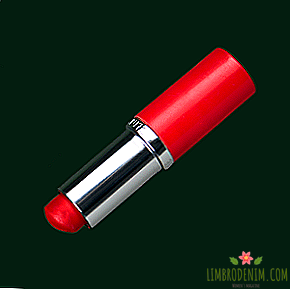Singer Nadezhda Gritskevich about favorite books
IN BACKGROUND "BOOK SHELF" we ask journalists, writers, scholars, curators, and other heroines about their literary preferences and publications, which occupy an important place in their bookcase. Today, Nadezhda Gritskevich, a musician and soloist of the Naadya group, shares her stories about favorite books.

I can not say that we had a lot of books at home, at least in my room. I was born and raised in Kogalym, it is a small city in Western Siberia, it is my age mate. Mom got there by distribution, and dad made a willful decision to work at the rig to prove to himself that he could. The library was made up of what could be obtained. I also remember that almost all my friends had a funny blue children's Bible, which our parents, apparently, were given out at work.
Books from childhood hurt me. “Mumu” we read in class and wept with the whole class. I loved Astrid Lindgren terribly. If I liked the book, I could read all night until I finished reading it, it was like this with Peppy Longstocking. I still remember how I read "Carlson, who lives on the roof": it was too late, I closed the book, my parents talked in the kitchen. Something happened that evening, as if I had opened a little chest with quiet grief ahead of time. Astrid Lindgren I could no longer read. When I first read The Three Musketeers, I realized that literature does not have to pick out all life from you, books can be entertaining. "Three Musketeers" - my first experience binge reading.
I read a lot at the institute, I could go to the bookstore and spend hours choosing books. Basically, of course, my choice fell on paperback books for many reasons. It is nice to have an expensive hardcover edition in the library for many centuries, but it's even more pleasant to carry your favorite book with you everywhere. At that time, Palanik, Sorokin, Bukowski, Kundera, Marquez, Pelevin, Pavic were reading. I fell in love with Marquez right after "No one writes to the colonel." I generally liked the palanic for its cinematography: in his books one could meet many powerful visual images. Although now, thanks to these powerful images, all his books in my head were mixed in a tight knot, of course, from the guts - but it seems that the guts were always closer to me than the landscapes painted by tea.
Probably, it is obvious that I am a compulsive reader. I can not read anything for half a year, and then with great interest at once to read a book, I can immediately forget it. I don’t have one channel for getting information about books - that’s why there is no system either. I can not name any one book that "plowed me". But I can say for sure what book influenced the reading of other books - it was accidentally found in the printout of "Native Speech" by Peter Weil and Alexander Genis. And I had only half of this book. I bought it all and read it already in Moscow. This book taught me the perception and perception of a literary text.
The first book I read in English was The Bridget Jones Diary. Well, this is not counting "The Catcher in the Rye", which everyone seems to read in English classes. Then there was an unsuccessful attempt to read Iris Murdoch. Then a friend put me on David Cedaris. Then there was a period of fascination with Michael Scheibon, I read Pittsburgh Secrets and bought several more of his novels, but I have not mastered it and still believe that Pittsburgh Secrets is his most personal and tender book. I try to read more in English, but the fiction is hard, so basically it's non-fiction like "How Music Works" by David Byrne, or Jonathan Franzen's essay, or quite practical books like "Art of Thinking Clearly".

Jonathan Safran Foer
"Meat. Eating animals"
Interesting essay on eating meat. Many of the friends to whom I advised this book said that they were not yet ready to give up meat and therefore did not want to read it. Safran Foer himself on the first pages explains that the work done by him does not necessarily incline someone to vegetarianism, but rather to a more meaningful approach to eating animals. The book is not devoid of poetry, it has interesting visual solutions and unexpected passages bordering trolling (for example, quite a sensible line of reasoning leads the author to the idea of eating by the owners of their own dogs), but also a lot of useful factual information.
Vladimir Nabokov
"Protection Luzhin"
One of the books I reread several times. I do not amuse myself with the illusions that I understand though to be the first three layers of the game of Nabokov. But every time I am touched by the story of a young prodigy, deprived of parental understanding, and his painful extinction. I am also close to the heroine who is trying to save him and fails. I read Nabokov because of such things: "But the moon came out because of angular black branches, a round, full-bodied moon, a vivid confirmation of victory, and when Luzhin finally turned and stepped into his room, there was a huge rectangle lying on the floor moonlight, and in this light is his own shadow. "
Charles Burns
"Black Hole"
The first graphic novel I read about three years ago in the summer made a strong impression on me. The action takes place in Seattle in the 70s. Among adolescents, a new disease has emerged that is sexually transmitted. The mysterious disease causes the cells of the body to mutate, but each mutation is individual. You can see this metaphor of growing up, or you can absorb it as a mystical thriller about the unknown.
Vladimir Sorokin
"Horse soup"
In the prose of Vladimir Sorokin there is some kind of audacity inherent only to a person who can disassemble literature and assemble it, like a Rubik's cube, right before your eyes. I added Horse Soup to the list, because in terms of impact this piece is like a knife strike: it is impossible to guess the direction of the plot, but nothing good can be expected. It is interesting to observe the dynamics of these strange relationships, and how the dependence turns into interdependence. But I love Sorokin and everything else: “The Day of the Oprichnik,” “The Thirtieth Love of Marina,” “The Snowstorm,” “The Sugar Kremlin,” “Roman,” “Blue Fat,” and “Normu.”
Silvia Plath
"Under the glass case"
To my shame, I read quite recently - first in Russian, then in English. The incredible ease of this book is explained by the fact that it is actually Sylvia Plath's diary, all heroes have real prototypes, and the main character is Sylvia. You can almost hear her voice: "My mind slammed shut like a sink." I loved this book very much and it would sound naive, but after the chapter with crab salad in avocado, I wanted to be friends with the author before the shout.
Virginia Woolf
"Own room"
One of the most elegant statements about why you should avoid victim status. In this short essay, Virginia Woolf talks about how what is called “female prose” appeared, and why it is destructive to call “female” everything that is done by a woman.
Miranda July
"The First Bad Man"
The latest novel by Miranda Julay, which tells the story of the emergence of a strange attachment between an adult woman and her colleague's daughter. Miranda July all the time one way or another explores the theme of relationships between unfamiliar people - a few years ago she came up with the Somebody application, which offered to share something intimate with those who can not be close. My acquaintance with the work of Miranda Julay began with the film "Me and You and Everyone We Know", already in the name of which literally there are not only the notorious "you" and "I", but also "everyone we know." So it turns out that our experience is always universally human.
Albert Camus
"Stranger"
The first story by Albert Camus. With this book, I had complete harmony from the first pages. In interviews, people often ask me if I am always so detached, they note the "coldness" of our music. I often do not know what to answer: all people have different temperaments, but even sometimes it seems to me that I live behind the wall from myself.
Anna Yablonskaya
"Pagans"
Anna Yablonskaya died as a result of the terrorist attack at Domodedovo airport in the midst of her career. A month before her death, the premiere of the play “Pagans” took place in Teatr.doc. I have not yet had to read such honest and simple thoughts about the state of the new Russian faith, in which God, business, and totem get along. My relationship with modern drama began with the plays of Yuri Klavdiev - "Anna", "Bullet Collector". Before that, I remember how I was struck by the simplicity, naivety and accuracy of the works of Alexander Vampilov.
Yuri Nagibin
"Get up and go"
This story is amazing because it is almost the first work in which we hear the voice of the real Yuri Nagibin, and not his successful counterpart. An almost masochistic study of evil deeds, an attempt to understand and accept oneself, though not an exalted sufferer, but alive, and justify all these sacrifices with the writing.




